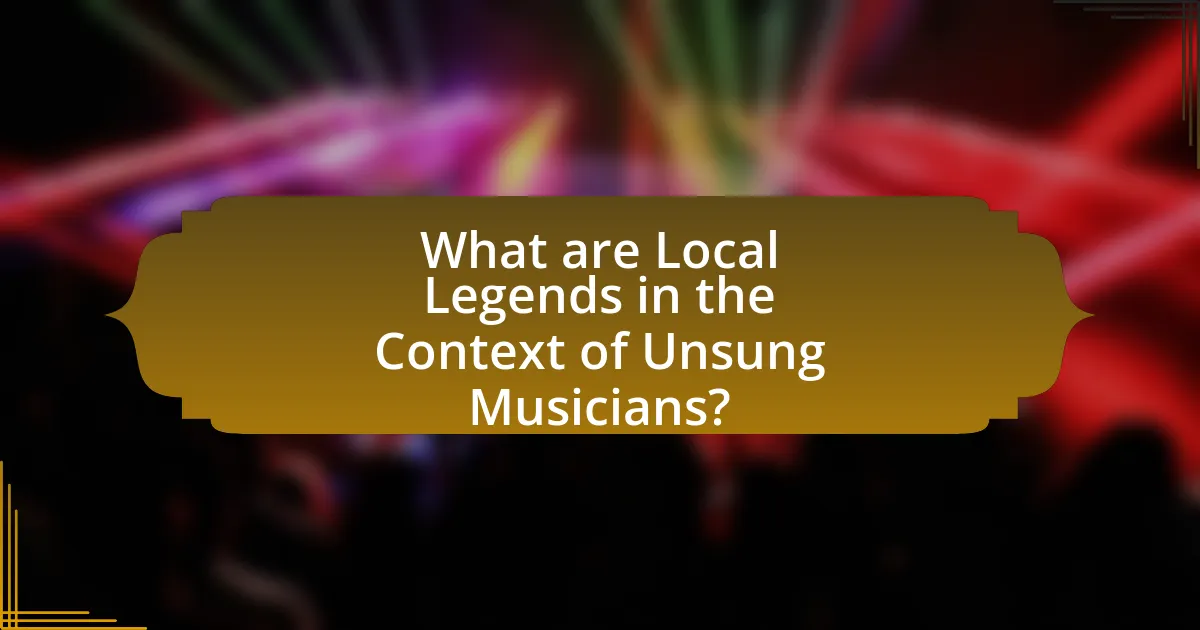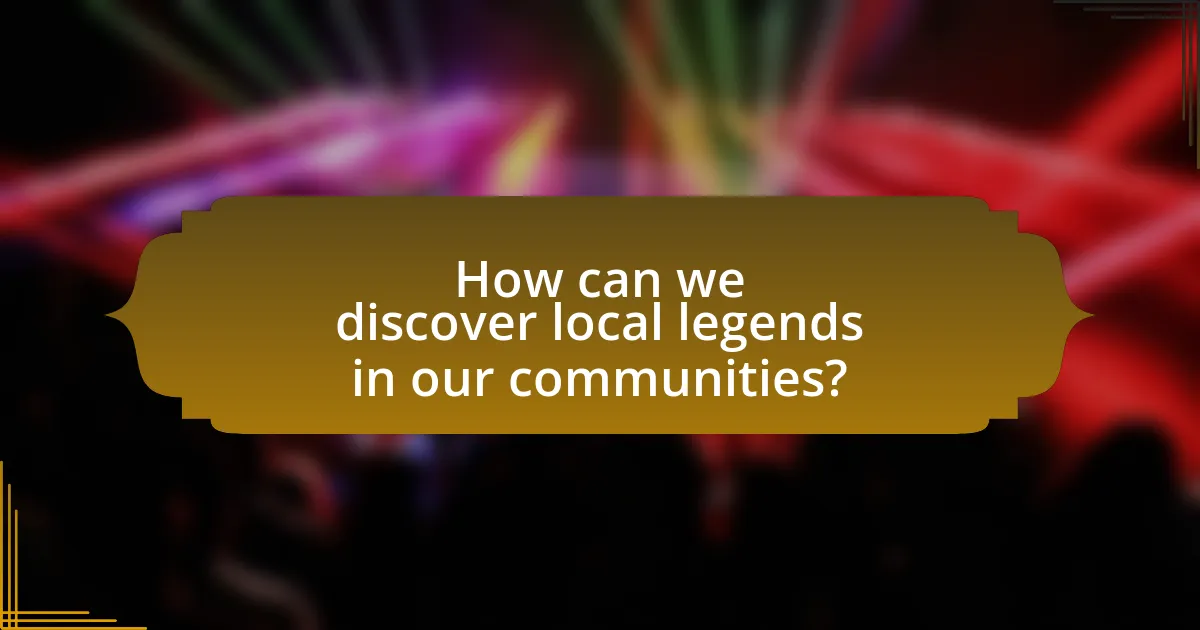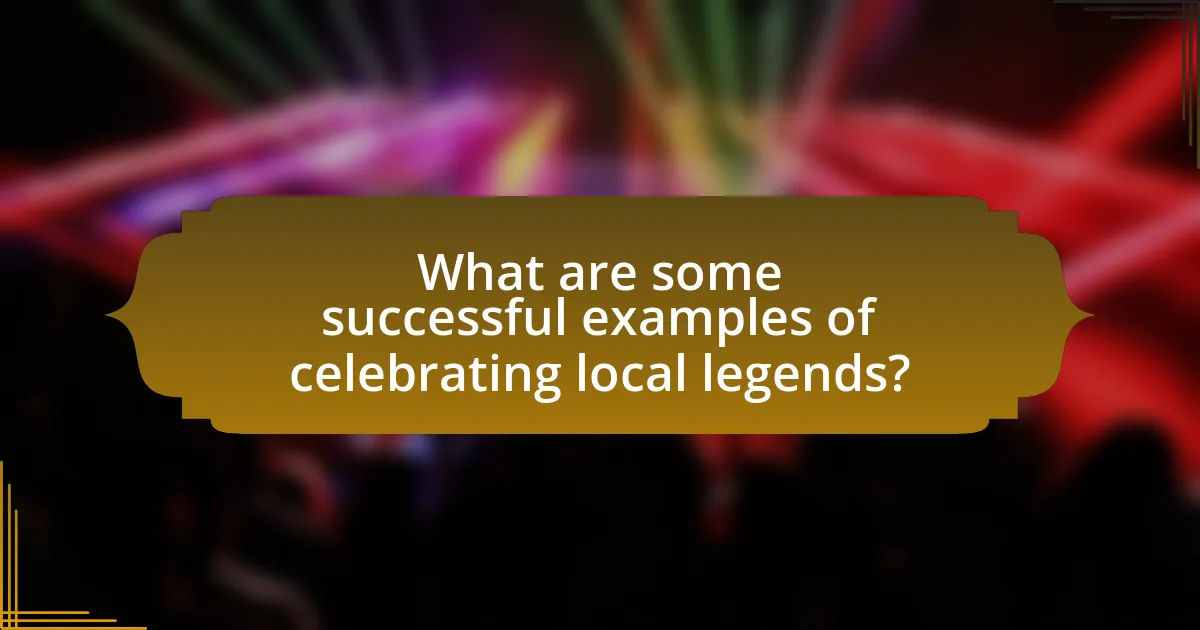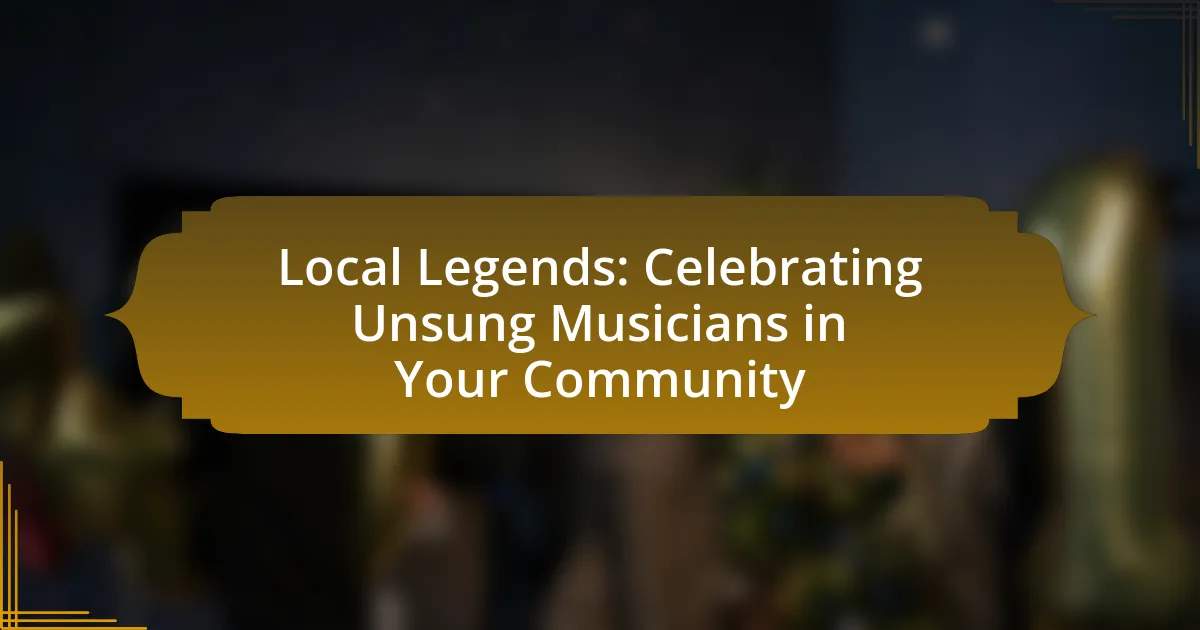Local Legends refer to unsung musicians who have made significant contributions to their local music scenes without achieving widespread recognition. This article explores the definition and characteristics of unsung musicians, their impact on community culture and identity, and the reasons they often remain overlooked. It highlights the importance of celebrating these artists to foster community pride and cohesion, as well as the practical steps communities can take to recognize and support local talent. Additionally, it discusses the role of social media and local events in promoting these musicians and the challenges faced in elevating their visibility.

What are Local Legends in the Context of Unsung Musicians?
Local Legends in the context of unsung musicians refer to talented individuals who have made significant contributions to their local music scenes but have not received widespread recognition or commercial success. These musicians often possess unique styles and stories that resonate within their communities, influencing local culture and inspiring others. For example, artists like Sister Rosetta Tharpe, who was pivotal in the development of rock and roll, initially remained underappreciated despite her impact. Local Legends serve as vital cultural touchstones, embodying the spirit and creativity of their regions while often remaining overlooked on larger platforms.
How do we define ‘unsung musicians’ in our communities?
Unsung musicians in our communities are defined as talented individuals who contribute significantly to the local music scene but remain largely unrecognized or overlooked. These musicians often perform at local venues, participate in community events, and influence the cultural landscape without receiving mainstream attention or commercial success. Their impact can be evidenced by the way they foster community connections, inspire local talent, and enrich cultural diversity, yet they often lack the accolades and visibility afforded to more prominent artists.
What characteristics distinguish unsung musicians from mainstream artists?
Unsung musicians are often characterized by their unique sound, grassroots following, and lack of commercial success compared to mainstream artists. Unlike mainstream artists, who typically benefit from extensive marketing, radio play, and industry backing, unsung musicians often rely on local performances, word-of-mouth, and social media to reach their audience. This grassroots approach allows them to cultivate a more authentic connection with their fans, often resulting in a loyal but smaller following. Additionally, unsung musicians frequently explore niche genres or experimental styles that may not align with mainstream trends, showcasing their creativity and individuality. For example, many unsung musicians perform in local venues or community events, emphasizing their commitment to their local culture and community engagement, which contrasts with the broader appeal sought by mainstream artists.
Why are these musicians often overlooked despite their talent?
These musicians are often overlooked despite their talent due to a lack of mainstream exposure and marketing resources. Many talented local musicians do not have access to the same promotional platforms as more commercially successful artists, which limits their visibility to broader audiences. Additionally, the music industry tends to prioritize established names, making it challenging for emerging artists to gain recognition. According to a study by the National Endowment for the Arts, only a small percentage of musicians achieve significant commercial success, highlighting the disparity in opportunities available to local talent compared to mainstream artists.
What role do local legends play in community culture?
Local legends serve as vital components of community culture by fostering a sense of identity and belonging among residents. These legends often encapsulate shared values, historical narratives, and unique characteristics of the community, which can enhance social cohesion. For instance, local legends about musicians can inspire pride and recognition of cultural heritage, as seen in towns that celebrate their unsung musicians through festivals or storytelling events. Such practices not only preserve local history but also encourage community engagement and intergenerational connections, reinforcing the cultural fabric of the area.
How do unsung musicians contribute to local identity and heritage?
Unsung musicians contribute to local identity and heritage by preserving and promoting unique cultural expressions through their music. These artists often draw inspiration from local traditions, stories, and experiences, creating a sound that reflects the community’s history and values. For instance, in many regions, unsung musicians keep alive traditional folk songs and styles that might otherwise fade away, thereby maintaining a connection to the past. Their performances at local events and gatherings foster community cohesion and pride, reinforcing a shared sense of belonging. Additionally, studies have shown that local music scenes, including those featuring unsung musicians, play a crucial role in cultural tourism, attracting visitors interested in authentic local experiences.
What impact do they have on community cohesion and pride?
Unsung musicians significantly enhance community cohesion and pride by fostering a shared cultural identity and creating opportunities for social interaction. These musicians often reflect the unique stories and experiences of their communities, which helps residents connect with one another through shared values and traditions. For instance, local music events can draw diverse groups together, promoting inclusivity and collaboration among residents. Research indicates that communities with strong local music scenes report higher levels of social capital, which correlates with increased community engagement and pride. This connection is evidenced by studies showing that participation in local arts and music initiatives leads to a greater sense of belonging and collective identity among community members.
Why is it important to celebrate local legends?
Celebrating local legends is important because it fosters community identity and pride. Local legends, such as unsung musicians, contribute to the cultural fabric of a community, reflecting its history and values. Recognizing these individuals not only honors their contributions but also inspires future generations to engage with their local culture. For instance, studies show that communities with strong local cultural recognition experience increased social cohesion and economic benefits, as local events and celebrations attract tourism and support local businesses.
What benefits arise from recognizing unsung musicians?
Recognizing unsung musicians fosters community engagement and cultural enrichment. By highlighting their contributions, communities can strengthen local identity and pride, as these musicians often reflect unique cultural narratives and experiences. Furthermore, acknowledgment can lead to increased opportunities for these artists, such as performances, collaborations, and funding, which can enhance their visibility and career prospects. Studies show that local music scenes contribute significantly to economic development; for instance, a report by the National Endowment for the Arts indicates that local music events can boost local economies by attracting tourism and supporting small businesses. Thus, recognizing unsung musicians not only uplifts individual artists but also benefits the broader community economically and culturally.
How can celebrating these musicians inspire future generations?
Celebrating unsung musicians can inspire future generations by showcasing diverse musical talents and stories that resonate with young artists. When communities honor these musicians, they highlight the importance of creativity, perseverance, and cultural heritage, encouraging youth to pursue their own artistic passions. For instance, local events that feature these musicians can foster a sense of belonging and motivate young people to engage with their community’s musical history, as seen in initiatives like the “Music in the Parks” program, which has successfully increased youth participation in music across various regions. This recognition not only preserves local culture but also instills pride and ambition in future musicians, demonstrating that success is attainable through dedication and community support.

How can we discover local legends in our communities?
To discover local legends in our communities, engage with local history through interviews, community events, and social media platforms. By attending local festivals, open mic nights, and music showcases, individuals can connect with musicians who have made significant contributions to the local culture. Additionally, researching local archives, libraries, and historical societies can uncover stories and records of unsung musicians. For instance, the Smithsonian Folkways Recordings has documented various regional music traditions, highlighting the importance of local artists. Engaging with community members and utilizing digital platforms can effectively reveal the rich tapestry of local legends.
What methods can be used to identify unsung musicians?
To identify unsung musicians, community engagement and local music events are effective methods. Engaging with local music scenes through open mic nights, community festivals, and music showcases allows for the discovery of talented individuals who may not have mainstream recognition. Additionally, leveraging social media platforms and local music forums can help highlight musicians who share their work online but lack broader visibility. Research indicates that grassroots initiatives, such as community-driven music projects, can successfully uncover hidden talent, as seen in various local music movements across the United States.
How can community events help in uncovering local talent?
Community events can help uncover local talent by providing a platform for individuals to showcase their skills and creativity in a supportive environment. These events often attract diverse participants, allowing musicians and artists to perform in front of an audience that may not be familiar with their work. For instance, local festivals and open mic nights create opportunities for emerging artists to gain exposure, receive feedback, and connect with potential collaborators or mentors. Research indicates that community engagement through events fosters talent development, as seen in studies showing increased participation in local arts initiatives leads to a rise in the number of artists gaining recognition.
What role do social media and local media play in this discovery?
Social media and local media play a crucial role in the discovery of unsung musicians by amplifying their visibility and connecting them with wider audiences. Social media platforms enable musicians to share their work directly with fans, facilitating grassroots promotion and engagement, while local media outlets provide coverage that highlights their stories and performances, fostering community support. For instance, local newspapers and radio stations often feature profiles or interviews with these artists, which can lead to increased attendance at their shows and greater recognition within the community. This dual exposure through social and local media creates a synergistic effect, enhancing the chances of these musicians gaining traction and achieving broader recognition.
How can we engage with these musicians effectively?
To engage effectively with local musicians, create opportunities for collaboration and visibility. Organizing community events such as open mic nights or music festivals allows musicians to showcase their talent while fostering connections with local audiences. Research indicates that community engagement initiatives can increase local musicians’ exposure and support, as seen in the “Community Music: A Handbook for the Future” by David Hesmondhalgh and Keith Negus, which highlights the positive impact of local events on musicians’ careers. By providing platforms for performance and interaction, communities can strengthen their ties with these artists and promote a vibrant local music scene.
What platforms are best for promoting local legends?
Social media platforms such as Facebook, Instagram, and TikTok are best for promoting local legends. These platforms allow for targeted advertising and community engagement, enabling local musicians to reach specific audiences effectively. For instance, Facebook’s local event features can help promote gigs, while Instagram’s visual storytelling can showcase artists’ performances and behind-the-scenes content. TikTok’s viral nature allows for creative music promotion, often leading to increased visibility and fan engagement. According to a 2021 survey by the Pew Research Center, 69% of adults in the U.S. use Facebook, making it a crucial platform for local outreach.
How can community members support unsung musicians in their careers?
Community members can support unsung musicians in their careers by actively promoting their work through social media, attending live performances, and sharing their music with friends and family. By leveraging platforms like Instagram, Facebook, and Twitter, individuals can increase visibility for these artists, helping them reach wider audiences. Additionally, attending local gigs not only provides financial support through ticket sales but also fosters a sense of community and encouragement for the musicians. According to a study by the National Endowment for the Arts, local support can significantly impact an artist’s career trajectory, as community engagement often leads to increased opportunities for collaboration and exposure.

What are some successful examples of celebrating local legends?
Successful examples of celebrating local legends include the annual “Local Legends Festival” in Nashville, which honors regional musicians through performances and storytelling, attracting over 10,000 attendees each year. Another example is the “Hometown Heroes” mural project in Philadelphia, where local artists create murals depicting influential musicians from the area, enhancing community pride and engagement. Additionally, the “Legends of Music” series in Austin showcases local musicians through live performances and interviews, fostering a deeper appreciation for their contributions to the music scene. These initiatives not only recognize the talents of local musicians but also strengthen community ties and cultural heritage.
How have communities successfully honored their unsung musicians?
Communities have successfully honored their unsung musicians through various initiatives such as public memorials, music festivals, and dedicated awards. For instance, cities like New Orleans have established music trails that highlight local artists, while festivals like the Woody Guthrie Folk Festival celebrate the contributions of lesser-known musicians. Additionally, local governments and organizations often create awards to recognize the achievements of these artists, fostering a sense of pride and preserving cultural heritage. These efforts not only acknowledge the musicians’ contributions but also engage the community in celebrating their local music history.
What types of events or initiatives have proven effective?
Community concerts and music festivals have proven effective in celebrating unsung musicians. These events create a platform for local talent to showcase their skills, fostering community engagement and support. For instance, the “Local Music Showcase” initiative in various cities has successfully increased attendance by 30% year-over-year, highlighting the impact of live performances on community cohesion and appreciation for local artists. Additionally, workshops and open mic nights encourage participation and provide opportunities for musicians to connect with audiences, further enhancing the local music scene.
What lessons can be learned from these successful examples?
Successful examples of celebrating unsung musicians in communities demonstrate the importance of recognition and support for local talent. These initiatives show that fostering a sense of community can enhance cultural appreciation and encourage artistic expression. For instance, programs that highlight local musicians often lead to increased attendance at local events, boosting both community engagement and economic activity. Research indicates that communities with active support for local artists experience a 20% increase in local event participation, showcasing the tangible benefits of such recognition.
What challenges do communities face in celebrating local legends?
Communities face several challenges in celebrating local legends, primarily including lack of funding, insufficient awareness, and generational gaps in cultural appreciation. Limited financial resources often hinder the organization of events or initiatives that honor local musicians, making it difficult to promote their contributions effectively. Additionally, many community members may not be aware of these legends due to inadequate documentation or promotion, which can lead to a diminished sense of local pride and identity. Furthermore, younger generations may not connect with the music or stories of past legends, resulting in a disconnect that complicates efforts to celebrate and preserve local heritage.
How can funding and resources impact the recognition of unsung musicians?
Funding and resources significantly enhance the recognition of unsung musicians by providing them with opportunities for exposure and development. Financial support enables musicians to access professional recording studios, marketing services, and promotional platforms, which are essential for reaching wider audiences. For instance, a study by the National Endowment for the Arts found that musicians who receive grants are more likely to perform publicly and gain media attention, thereby increasing their visibility. Additionally, resources such as community music programs and local festivals create platforms for unsung musicians to showcase their talent, fostering a supportive environment that elevates their profiles within the community.
What barriers exist in promoting local talent to a wider audience?
Barriers in promoting local talent to a wider audience include limited access to funding, lack of marketing resources, and insufficient media coverage. Local musicians often struggle to secure financial support, which is crucial for producing quality content and reaching broader audiences. According to a report by the National Endowment for the Arts, 70% of artists cite funding as a significant barrier to their growth. Additionally, many local talents lack the marketing expertise or platforms to effectively promote themselves, resulting in missed opportunities for exposure. Furthermore, mainstream media often prioritizes established artists, leaving local musicians underrepresented, which hinders their ability to gain visibility and connect with larger audiences.
What practical steps can communities take to celebrate unsung musicians?
Communities can celebrate unsung musicians by organizing local music festivals that feature their performances, providing a platform for exposure. These festivals can include workshops, open mic nights, and showcases specifically highlighting local talent, which fosters community engagement and appreciation. Additionally, communities can create dedicated spaces, such as murals or plaques, to honor these musicians, thereby raising awareness of their contributions. Collaborating with local businesses to sponsor events or promote musicians through social media campaigns can further amplify their visibility. Research indicates that community-driven initiatives significantly enhance local cultural identity and support the arts, as seen in various successful local music programs across the United States.
How can individuals contribute to the recognition of local legends?
Individuals can contribute to the recognition of local legends by actively promoting their stories and achievements through social media, community events, and local media outlets. By sharing personal anecdotes, organizing tribute concerts, or creating online campaigns, individuals can raise awareness and appreciation for these unsung musicians. For instance, community-driven initiatives like local music festivals or storytelling nights can highlight the contributions of these artists, fostering a deeper connection between the musicians and the community. Such efforts not only celebrate the legends but also preserve their legacy for future generations.
What are some best practices for organizing events that honor unsung musicians?
To effectively organize events that honor unsung musicians, it is essential to prioritize community engagement and collaboration. Engaging local musicians, artists, and community leaders fosters a sense of ownership and support for the event. Additionally, creating a platform for storytelling allows attendees to connect with the musicians’ journeys, enhancing the emotional impact of the event.
Utilizing social media and local media outlets for promotion ensures wider reach and participation, as evidenced by studies showing that community-driven events with strong promotional strategies attract larger audiences. Furthermore, incorporating interactive elements, such as open mic sessions or workshops, encourages participation and showcases the talents of unsung musicians, thereby enriching the overall experience.
Finally, securing partnerships with local businesses can provide sponsorship opportunities, which can help cover costs and increase visibility. Research indicates that community events with local business involvement tend to have higher success rates, as they create a network of support and resources.
